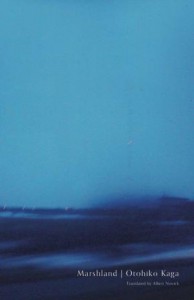The new year is all dressed up with a powerful display of voices in translation: a Japanese epic, a tri-lingual edition of Mexican poetry, and the latest collection of prose from one of France’s most spiny and entertaining voices. Read on to find out more!

Marshland by Otohiko Kaga, translated from the Japanese by Albert Novick, Dalkey Archive Press, 2024
Review by Iona Tait, Copy Editor
In a 1986 article published in Japan Quarterly, the Japanese psychiatrist-turned-novelist Otohiko Kaga wrote about his captivation with the Japanese marshes, describing them as “a wasteland, totally resistant to human attempts at exploitation.” These same untouched regions make up the setting of his novel Marshland, originally published in 1985 and translated now into English by Albert Novick. In this sprawling epic, the marshes, as a virgin land, act as a counterpart to the oppressive state structures of the metropolis. They—being of no use—allow Kaga to explore his central theme: space, and the reclamation of space for freedom and freedom of thought.
Hailing from the marshes, the protagonist, Atsuo Yukimori, is a middle-aged former convict whose job as an auto-mechanic in Tokyo keeps his life together—but only barely. Spending the majority of his life “as a slave to the state,” he lives in fear of the army and the police, and his job security depends on the whims of his boss, to whom the former speaks “like a puppy dog.” All the while, Atsuo’s criminal past lingers in close quarters, with a burn on his finger (punishment for stealing as a child) standing as a reminder. The delicate order of this life—his tidy bedroom, his punctuality—soon begins to unravel, however, when he meets a young student called Wakako Ikéhata at an ice rink. The pair develop an intense relationship, and eventually find themselves entangled in the violent student protests of 1968. Falsely accused of placing a bomb on a train, Atsuo and Wakako are detained by police and imprisoned, spending ten years in prison waiting for a judicial appeal.
Spanning over eight hundred pages, Marshland details governmental abuses of power in post-war Japan through various narrative perspectives, various institutions, and across a vast period of time. Kaga masterfully demonstrates the grueling legal process that kept Atsuo and Wakako in prison, including their detention before being forced to give a confession (detaining individuals before they were sentenced was a feature of Japanese criminal law until it was overturned in 2023). Repeating the details of the trial throughout the majority of the novel, Kaga shows the mentally and physically taxing effects, ranging from psychosis to suicide, of institutionalization and detention on every victim involved—which include Atsuo’s nephew, Yukichi Jinnai, and Wakako’s former lover, the radical student Makihiko Moroya. Whilst this technique does result in a few tedious episodes in which legal particularities are rehashed at length, the approach heightens the all-consuming nature of the trial for the convicts, and succeeds in conveying the lengthy passage of time; the novel alternates between the day-to-day pace of scenes in Tokyo, visits to the marshes, long periods in prison, and swift logs or diary entries which reveal the laboring process of the trial and work done by Atsuo’s lawyers.

